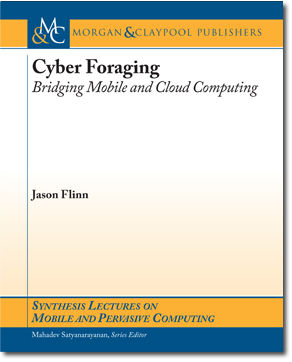Jason Flinn Authors Book on Mobile and Pervasive Computing

 Enlarge
Enlarge
Professor Jason Flinn has authored a new book entitled “Cyber Foraging – Bridging Mobile and Cloud Computing,” which has been published by Morgan & Claypool as a part of their Synthesis Lectures on Mobile and Pervasive Computing series.
The book provides an introduction to cyber foraging, a topic that lies at the intersection of mobile and cloud computing. Cyber foraging dynamically augments the computing resources of mobile computers by opportunistically exploiting fixed computing infrastructure in the surrounding environment and introduces a new, surrogate computing tier that lies between mobile users and cloud data centers. Surrogates are wired, infrastructure servers that offer much greater computing resources than those offered by small, battery-powered mobile devices.
The book first describes how cyber foraging systems dynamically partition data and computation. It shows how dynamic partitioning can often yield better performance, energy efficiency, and application quality than static thin-client or thick-client approaches for dividing functionality between cloud and mobile computers. It then describes the design of the surrogate computing tier. It shows how strong isolation can enable third-party computers to host computation and store data on behalf of nearby mobile devices. It then describes how surrogates can provide reasonable security and privacy guarantees to the mobile computers that use them. The book concludes with a discussion of data staging, in which surrogates temporarily store data in transit between cloud servers and mobile computers in order to improve transfer bandwidth and energy efficiency.
Prof. Flinn received his PhD in Computer Science from Carnegie Mellon University in 2001 and joined the faculty at Michigan in 2002. His research interests include operating systems, mobile computing, storage, and distributed systems. He is currently interested in creating software systems that allow concurrent programs to execute more reliably on multicore computers, as well as tools that help developers and administrators troubleshoot software problems such as misconfigurations. He is also interested in enabling demanding applications to run on small, mobile computers, as well as consumer electronic devices such as smartphones. Prof. Flinn heads the Pervasive Computing Research Group, and is a member of the Michigan Mobility Group. He often collaborate with other faculty members in the Operating Systems and Networking and Distributed Systems research groups.
More information:
 MENU
MENU